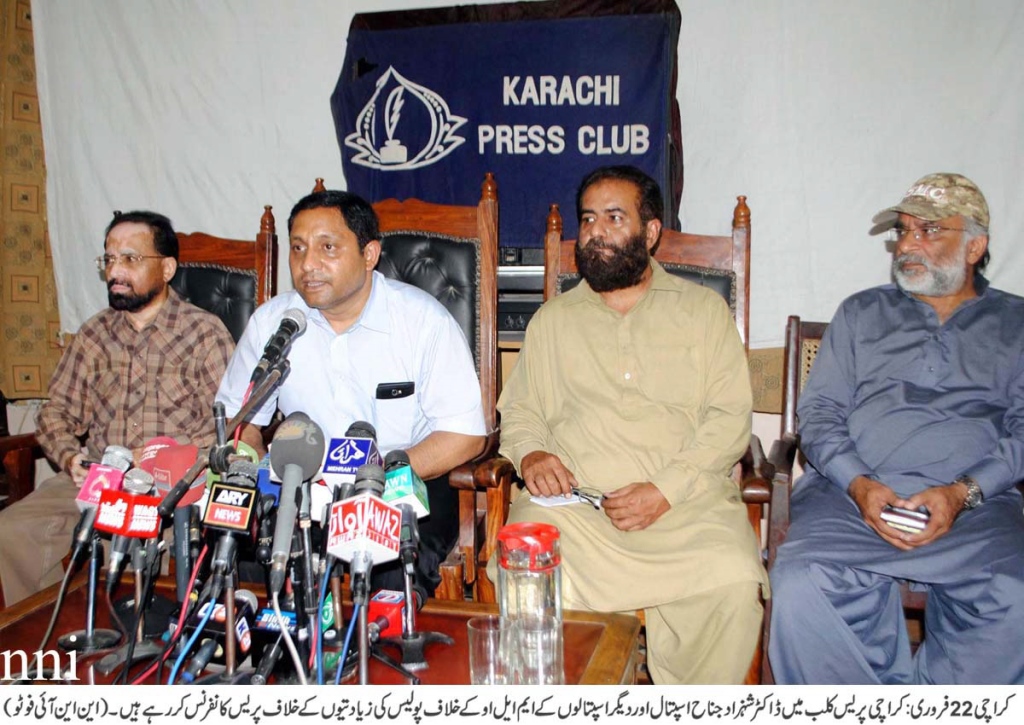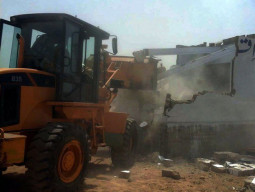
A whistleblower’s assertions about the veracity of infamous ‘police encounters’ in the city caused ripples within the police department on Sunday. So intimidated were the police by the evidence he had against their ‘illegal tactics’ that they allegedly forced him to erase all the findings of police encounter casualties from his laptop computer.
The whistleblower in question, the medico-legal officer at the Jinnah Postgraduate Medical Centre (JPMC), Dr Shehzad Ali, termed most of the police encounters in the city ‘staged’ and tantamount to ‘extra-judicial killings’.
The revelations were made by Dr Ali in a press conference following his release from the kidnapping and ‘third-degree’ torture, allegedly carried out by police personnel in civilian clothes. “I was kidnapped and subjected to inhumane torture for not agreeing to tamper with the post-mortem report of a police-encounter casualty,” said Dr Ali.

The medico-legal officer claimed he had been threatened by the police for the last several days, but said he refused to submit to their demands. “Ultimately, several armed police personnel in civilian clothes broke into my house at around 2:30am on Sunday and forced me to erase all the medico-legal records on my personal laptop at gun-point,” he said. Dr Ali was then taken to an unknown location where he was subjected to more torture before finally being released at around 3:40am.
“Around three weeks ago, Dr Shehzad [Ali] conducted a post-mortem examination on the body of an alleged police encounter casualty,” Karachi Police Surgeon Dr Jalil Qadir Memon, told The Express Tribune. “The post-mortem report, however, was not acceptable to the police for reasons known only to them; they wanted him to make changes in the report.”
Shortly after the policemen in civilian clothes - a hallmark of the police’s crime branch - were accused of beating and kidnapping the medico-legal officer, the department’s additional inspector general Khadim Hussain Bhatti came forward to defend the officials and personnel working under him. “I am stating with utmost certainty that no crime branch official or personnel was behind this kidnapping and torture,” said AIG Bhatti.
Déjà vu?
“Almost every week, the police personnel bring bodies of alleged criminals for examination. More often than not, they do not even know or bother to disclose the identity, ethnicity and affiliation of the casualty,” said Dr Ali. “We keep wondering that if the deceased was unknown to the police, how could they say with so much conviction that they were a criminal and deserved to be killed in an encounter.” The doctor added that the only way for them to ascertain the cause of death was to examine the fatal wounds but the police in such cases often attempted to exert pressure to manipulate the findings.
Meanwhile, as the reports of the alleged police brutality on the MLO began to surface, all the medico-legal officials working in public sector hospitals went on an indefinite strike in protest. Sensing the heat, the Karachi Karachi Police chief Ghulam Qadir Thebo has formed an inquiry committee, headed by DIG South Abdul Khaliq Sheikh, which will submit its findings back to the police chief.
This, however, was not the first case of police high-handedness in dealing with the medico-legal departments established at public sector healthcare facilities.
“The medico-legal officers have been facing such threats for a long time and many succumb to the pressure,” said Dr Nisar Ali Shah, a medico-legal officer at the Civil Hospital Karachi. “The police department, which is supposed to provide support to the medico-legal officers in determining the facts, demands them to tamper with the due process of law.”
For instance, added Dr Shah, if an alleged criminal had been shot from so close - say less than three feet - that the wound was blackened with gunpowder, how would a medico-legal officer corroborate with the police’s interest to show the casualty as a ‘police encounter’. “They [the police] would simply ask you to write 10 feet, instead of three feet,” said Dr Shah.
Published in The Express Tribune, February 23rd, 2015.

1732274008-0/Ariana-Grande-and-Kristin-Chenoweth-(1)1732274008-0-165x106.webp)















COMMENTS (1)
Comments are moderated and generally will be posted if they are on-topic and not abusive.
For more information, please see our Comments FAQ